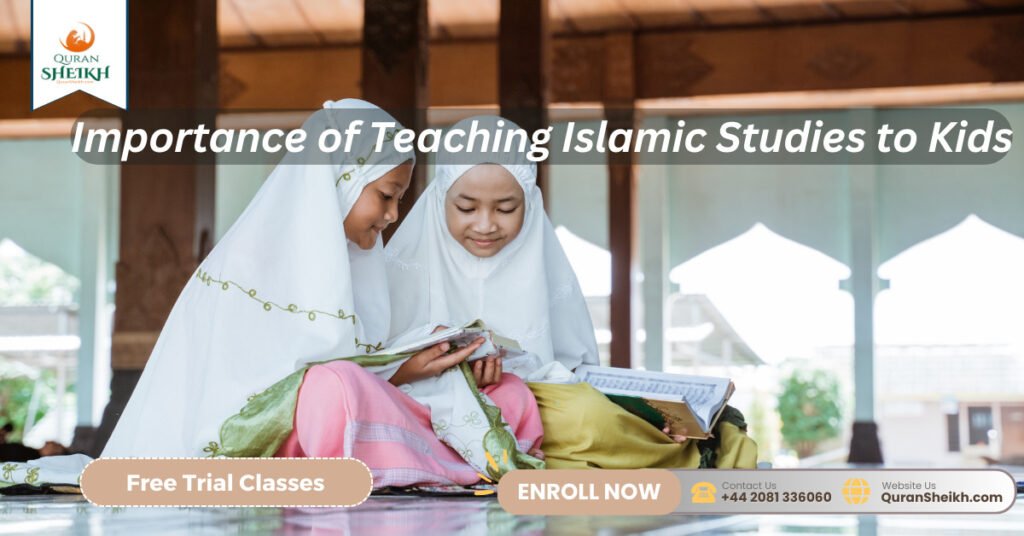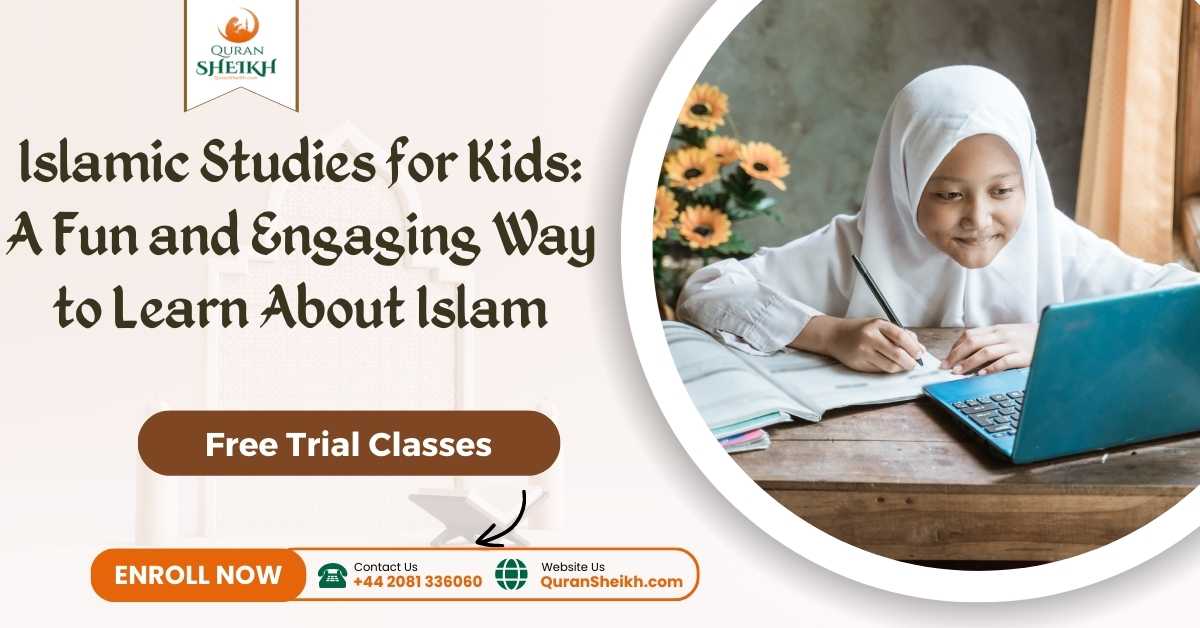In the past few years, Islamic Studies for young learners has become increasingly popular, with good reason. Exploring the teachings of Islam, its rich history, and unique culture can positively impact children by fostering a greater appreciation for their religion and reinforcing essential values of kindness, generosity, and empathy towards others.
Delve into how teaching Islamic Studies to children brings numerous advantages, emphasize the relevance of its curriculum, and present useful guidance on both home and school-based instruction.
Parents, teachers, and caregivers can now obtain all the required materials needed for instructing children in Islamic Studies in a creative and productive approach through this article.
Join thousands of Muslim Families who love learning Quran, Arabic and Islamic Studies from the comfort of their Homes.
Introduction to Islamic Studies for Kids

The exploration of the Islamic religion and its customs is known as Islamic Studies. Providing kids with an education in Islamic Studies lays the groundwork for lifelong discovery and understanding of their faith.
What is Islamic Studies?
The study of Islamic Studies highlights the fundamental tenets and rituals of the Islamic faith.The subject includes the study of the Quran, Hadith, Islamic history, culture, and traditions. It provides students with an understanding of their religion and its principles.
Why is it Important to Teach Islamic Studies to Kids?
Teaching the youth Islamic Studies is essential as it enables them to understand their religions significance, history, and customs. It allows them to understand the values and principles that guide their actions, thoughts, and beliefs. A sense of identity and belonging to their faith community is fostered through this practice.
Quran Memorization Course Online with an Arab teacher with 30% Off
Importance of Teaching Islamic Studies to Kids

Teaching Islamic Studies to kids has several benefits and challenges.
Benefits of Learning Islamic Studies for Kids
Learning Islamic Studies provides kids with a foundation of knowledge about their religion. This assists individuals in comprehending the teachings of the Quran and using them effectively in their lives. This instills in them a recognition of their own thoughts and feelings, boosts their self-assurance, and fosters regard for other individuals.
In addition, exploring Islamic history as well as culture provides an opportunity for children to recognize and comprehend the vast range of life within the Muslim world and its inhabitants.
Challenges in Teaching Islamic Studies to Kids
Educating children in Islamic Studies may prove difficult due to the depth of the content and their young age. The presentation of the material by teachers must be engaging, age-appropriate and relatable. Furthermore, it can be tough to teach Islamic Studies in a secular environment and compete with other subjects dominating the curriculum.
Islamic History and Culture for Kids

The study of Islamic History and Culture is an essential component of Islamic Studies for kids.
Overview of Islamic History and Culture
For over 1400 years, Islamic History has been enriched by a plethora of cultures and civilizations. Exploring the evolution, dissemination and influence of Islam throughout the world. Islamic traditions, customs, and practices are the primary elements that dictate the culture within the Muslim world.
Important Islamic Figures and Events
Islamic History is full of significant figures and events that have shaped the religion and world history. The Caliphate, the Battle of Badr, the spread of Islam to other lands, the Five Pillars of Islam, and Prophet Muhammad are among them.
Quranic Studies and Memorization Techniques for Kids
Quranic Studies and Memorization Techniques are crucial aspects of Islamic Studies for kids.
Teaching Kids Quranic Studies
Engaging kids in Quranic Studies requires multiple activities like interpretation of the Quran, Arabic language proficiency, and comprehension of verse context. It also includes the study of Tafsir or the interpretation of the Quran.
Effective Memorization Techniques for Kids
Memorizing the Quran is an essential part of Islamic Studies. Effective memorization techniques for kids include repetition, recitation, visualization, and use of technology. Learning the Quran through memorization helps strengthen the connection between the child and the Islamic faith.
Islamic Ethics and Morals for Kids
Teaching children Islamic ethics and morals is an important aspect of their Islamic education. It helps them develop positive behavior and character. The observation of adult behavior is how children acquire knowledge. Setting a positive precedent for them to emulate is imperative.
Teaching Kids Islamic Ethics and Morals
Teaching Islamic ethics and morals to kids can be done through stories, Quranic verses, and Hadiths. Children need to learn the values of honesty, respectfulness, kindness, and generosity. Parents and teachers should also encourage them to forgive others and seek forgiveness.
Examples of Islamic Ethics and Morals
Children ought to learn valuable principles of Islamic ethics and morals such as speaking truthfully, displaying honesty, showing deference towards elders and parents, treating animals kindly, being generous towards others, and abstaining from bad behavior such as lying, gossiping, and cheating. The positive character traits ingrained by teaching these values will persist with them for the duration of their lives.
Islamic Holidays and Traditions for Kids
Islamic holidays and traditions are an important part of Islamic education for kids. By understanding Islamic culture and history, individuals develop a more profound respect for these significant events connected to their daily existence.
Overview of Islamic Holidays and Traditions
The significant occasions in Islamic history, such as Ramadan, Eid, Hajj, and Mawlid, are honored through Islamic holidays and customs. Across the globe, Muslim families unite to celebrate and memorialize important occasions within Islamic history.
Celebrating Islamic Holidays with Kids
Parents and teachers can celebrate Islamic holidays with children. They can teach the children the importance of the holidays. Activities such as decorating the house and preparing special meals can add to the celebration. This helps them understand the importance of these events and instills a sense of pride in their Islamic heritage.
Islamic Education in the Modern World
Especially in the West, Islamic education encounters distinct challenges in contemporary times. However, there are also opportunities to use modern technology to promote Islamic education.
Challenges and Opportunities in Teaching Islamic Studies Today
In present times, teaching Islamic studies is chiefly daunting as it calls for eligible tutors capable of delivering exceptional education. Another challenge is the lack of access to Islamic educational resources in some regions.
Technology has made it possible to offer exceptional Islamic education to children globally.
Examples of Effective Islamic Education Programs for Kids
Some examples of effective Islamic education programs for children include online Quran classes, Islamic summer camps, and Islamic schools. These programs provide an immersive and interactive learning experience and help children develop a strong foundation in Islamic education.
Tips for Teaching Islamic Studies to Kids at Home or in Schools
Although it may be difficult to teach Islamic studies to children at home or in school, doing so is crucial for their Islamic upbringing. Implement these guidelines to foster a supportive and captivating educational setting.
Creating a Positive Learning Environment
Creating a positive learning environment is essential for teaching Islamic studies to kids. This includes creating a space that is free from distractions and conducive to learning. Parents and teachers should also be patient, kind, and understanding when teaching children.
Engaging Kids in Islamic Studies
To engage children in Islamic studies, parents and teachers should use interactive teaching methods such as games, stories, and role-playing. This helps children understand the material better and makes learning fun. It is also essential to involve children in discussions and encourage them to ask questions.
This promotes critical thinking and helps children develop a deeper understanding of the material. In conclusion, Islamic Studies for Kids is a crucial subject that can help children develop a deeper understanding of their faith, history, and culture.
Through educating children about Islam’s beliefs, codes of conduct, festivities, and customs, we can embed significant principles in them and facilitate their development into exemplary citizens.
This informative piece offers valuable pointers and supportive insights that parents, educators, and guardians can use to skillfully instruct youngsters in the principles of Islamic Studies while supporting their spiritual growth.
Why is Islamic studies important for kids?
Islamic studies are important for kids for a variety of reasons. First, they teach kids about their religion and culture. This can help kids develop a strong sense of identity and belonging. Second, Islamic studies can help kids develop a moral compass and learn about the importance of family and community. Third, Islamic studies can also help kids learn about the world around them and how to interact with people from different backgrounds. Finally, Islamic studies can help kids develop their critical thinking skills and learn how to solve problems.
Overall, Islamic studies are an important part of a child’s education and can help them grow into well-rounded and successful adults.
Here are some specific examples of how Islamic studies can benefit kids:
- Kids who learn about the Quran and Hadith develop a strong moral compass.
- Kids who learn about Islamic history and culture develop a sense of pride in their heritage.
- Kids who learn about Islamic law develop critical thinking skills and the ability to solve problems.
- Kids who learn about Islamic values develop a sense of empathy and compassion for others.
In short, Islamic studies can help kids become better people.
What is interesting about Islam for kids?
Islam is a fascinating religion with a rich history and culture. Here are some things that kids might find interesting about Islam:
- Islam is a religion of peace. The word “Islam” itself means “peace” in Arabic. Muslims believe that all people are created equal and that we should treat each other with respect.
- Islam is a diverse religion. There are over 1.8 billion Muslims in the world, and they come from all different backgrounds and cultures. This diversity is one of the things that makes Islam so interesting.
- Islam has a rich history. Islam was founded over 1,400 years ago by the Prophet Muhammad. Since then, Muslims have made significant contributions to art, science, literature, and architecture.
- Islam has many unique and interesting practices. For example, Muslims pray five times a day, fast during the month of Ramadan, and give to charity. These practices help Muslims to connect with their faith and with each other.
Why do we teach Islamic Studies in school?
Islam is a religion that has a rich history and culture. It is also a religion that is followed by billions of people all over the world. As such, it is important to teach Islamic Studies in school so that students can learn about this important religion and its impact on the world.
Here are some reasons why we teach Islamic Studies in school:
- To teach students about the history and culture of Islam.
- To teach students about the basic beliefs and practices of Islam.
- To teach students about the contributions that Muslims have made to society.
- To promote understanding and tolerance between different religions.
- To help students develop a sense of identity and belonging.
Islamic Studies is a valuable subject that can teach students about a religion that is followed by billions of people all over the world. It is a subject that can help students develop a better understanding of their own religion and the religions of others. It is also a subject that can help students develop a sense of identity and belonging.
In addition to the above, Islamic Studies can also help students to:
- Develop critical thinking skills and the ability to analyze religious texts and traditions.
- Develop an appreciation for the diversity of religious beliefs and practices.
- Learn about the ethical and moral principles of Islam.
- Develop a sense of social responsibility and justice.
Islamic Studies is an important subject that can help students to become more informed and well-rounded citizens. It is a subject that should be taught in schools all over the world.
Best Quran memorization program with qualified Arab tutors and get 30% OFF, Quran classes for Kids
FAQs
Q: What age should kids start learning about Islamic Studies?
A: There’s no set age for kids to start learning about Islamic Studies, but it’s recommended to introduce them to the subject as early as possible. Many Islamic schools offer programs for children as young as three years old.
Q: Do I need to be a Muslim to teach Islamic Studies to my kids?
A: No, you don’t have to be a Muslim to teach Islamic Studies to kids. However, it’s important to have a basic understanding of the subject and its teachings to effectively teach it to children.
Q: Is it necessary to enroll my kids in an Islamic school to teach them Islamic Studies?
A: No, you don’t have to enroll your kids in an Islamic school to teach them Islamic Studies. You can teach the subject to your kids at home by using online resources, books, and other materials.
Q: How can I make Islamic Studies engaging for my kids?
A: You can make Islamic Studies engaging for kids by using interactive teaching methods such as games, stories, and role-playing. You can also take your kids to visit museums, historical sites, and other places related to Islamic culture and history.


